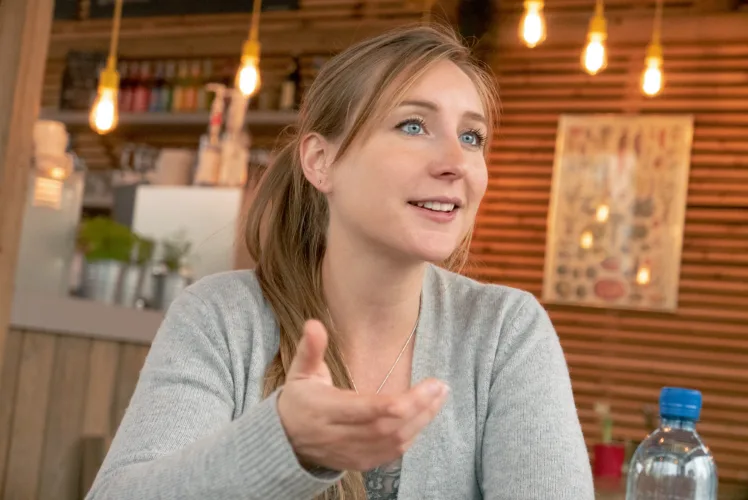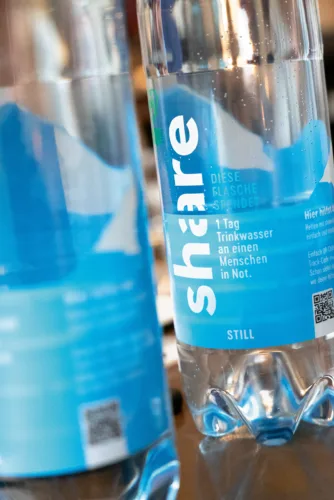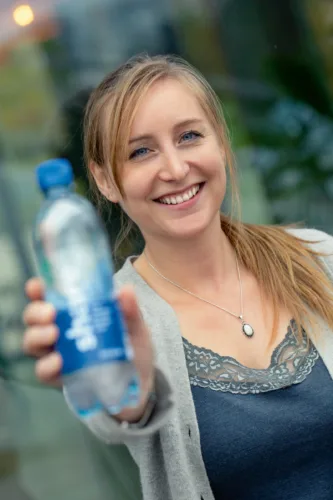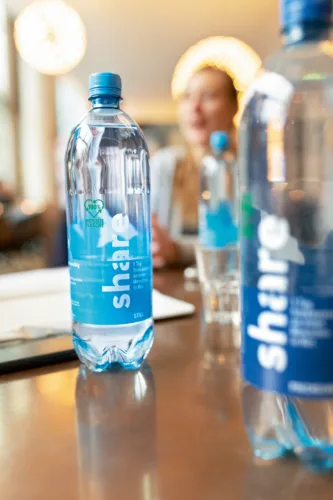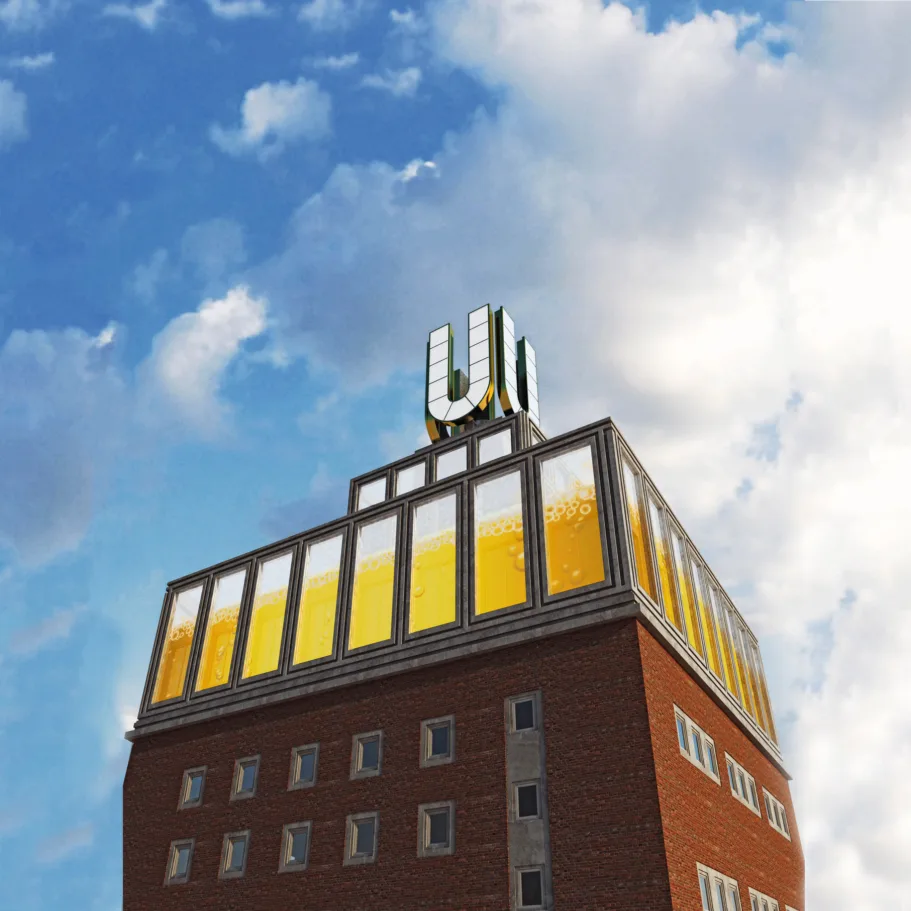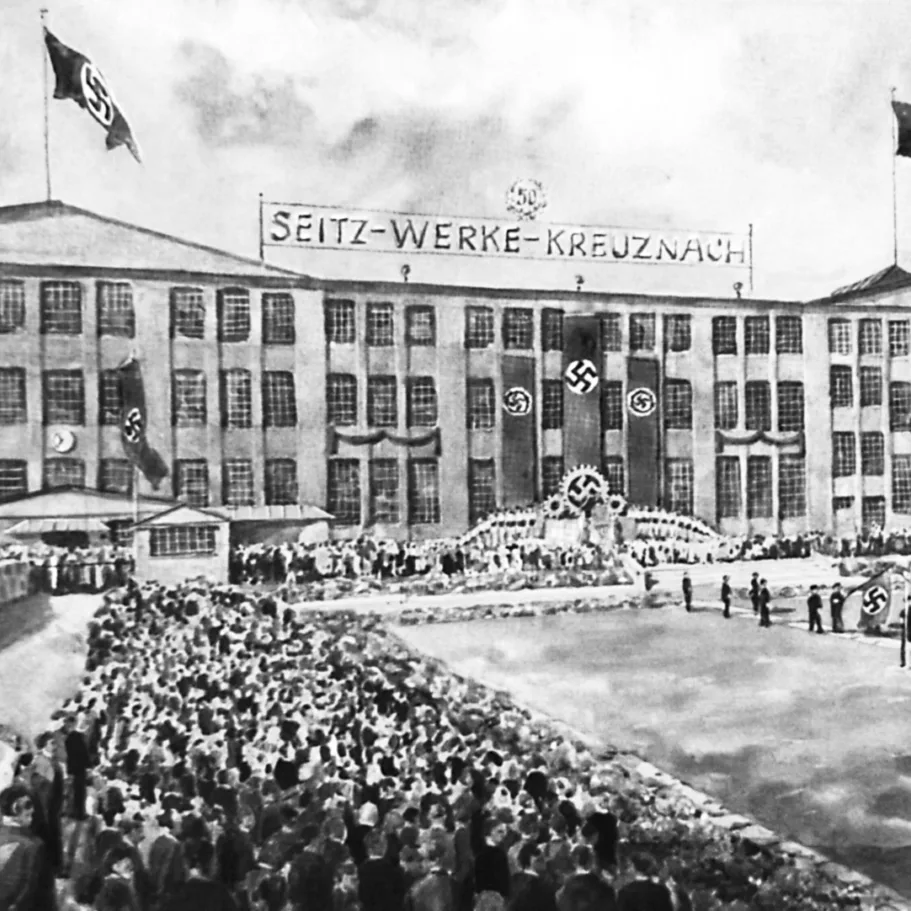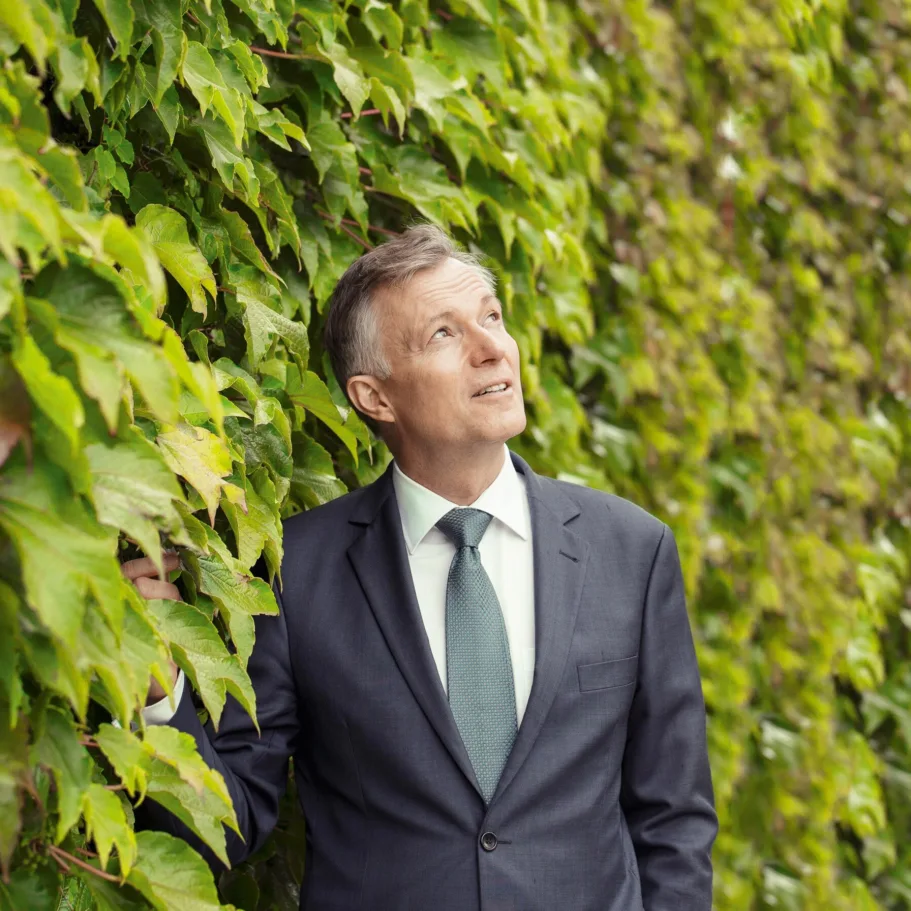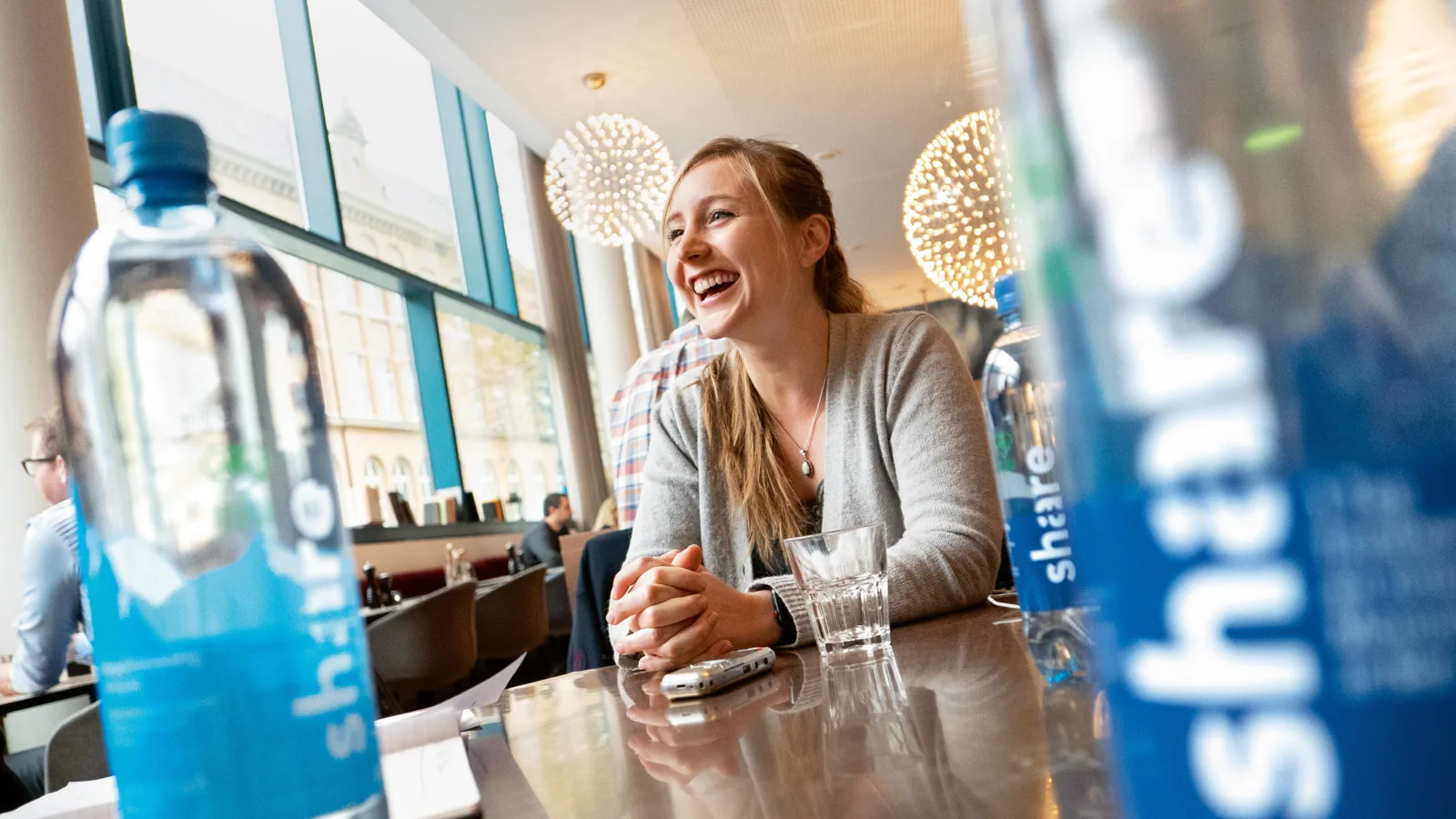
Shining example
“Nothing in the world is as powerful as an idea whose time has come.” Co-founder Iris Braun embraces this theory by French writer Victor Hugo when explaining the success of her Berlin startup share which brings social products to our supermarket and drugstore shelves.
How did you come up with the concept for share?
My co-founder Sebastian Stricker developed the ShareTheMeal app which you can donate a meal with and see where it goes using your smartphone. With a million users ShareTheMeal is now the biggest donation app in the world and is being continued by the United Nations – a huge success. However, one of the lessons learned from this project is how difficult it is to motivate people to do something good repeatedly. We thus thought about how we could reach out to even more people and make it easier for them to become involved. share and our 1+1 principle gradually evolved from this; the latter is based on the fact that for each product I buy at the supermarket a product of equal value is donated. In the case of a bottle of water that’s at least 20 liters of water because it makes no sense to send bottled water to developing countries. A meal is donated for each nut bar we sell and for our soap we donate one bar of soap to various hygiene projects. You don’t have to download an app for this nor remember to donate; you simply go shopping.
How did you manage to convince the retail trade of your concept?
When we started talking to REWE, dm* and various other retailers, we found we were preaching to the converted: there’s already a steadily increasing willingness to get involved – also in the mainstream. Social commitment in large companies is increasingly considered to be part of the brand image and an instrument with which to retain customer and employee loyalty – also by top management. The definitive handshake which marked the start of the project came from Lionel Souque, CEO of the REWE Group**. I think the fact that our 1+1 principle is so uncomplicated and transparent for the consumer is what had him convinced. Although perhaps he also simply allowed himself to be caught up in our passion for the idea.
*drogerie markt (dm): biggest drugstore chain in Europe. **REWE Group: with a turnover of €54 billion one of the largest retail groups in Germany.
»There’s a steadily increasing willingness to get involved – also in the mainstream.«
Co-founder of the Berlin startup share
Profile: Social intelligence
Born in a tiny village numbering just 1,000 inhabitants in the Fichtel Mountains in Germany, Iris Braun discovered her fascination for other countries and cultures on a school exchange to Oklahoma, USA. After receiving her high school diploma she did a BA in philosophy, politics and economics in Oxford. She then worked for two years as a management consultant for the Boston Consulting Group. She received her masters in economics at Harvard, majoring in the study of developing countries, before going to India for two years to research financial developments in rural areas. Back in Europe she met her share co-founders. The 30-year-old never dreamed that one day she would end up working in the consumer goods trade.
What’s share’s key to success?
Having the right idea at the right time and the right place. Today we can get through to the mainstream: the awareness that there are problems which also somehow concern us has never been greater. Younger people especially are looking for a purpose for their generation. This has sensitized them to problems which take place elsewhere. Nowadays you can also just hop on a plane and see what things are like there.
What do you do differently from the others?
More and more companies are acting as mediators between relief organizations and the consumer. We focus on communicating in detail where an individual donation goes and what it does exactly. Recently, I heard in a lecture that it’s not in our German nature to do good and talk about it but that we instead usually keep quiet about our good deeds. This sadly doesn’t work in our modern world of social media and ever-present communication, however: if you keep quiet, you go unnoticed – and go under. On the social networks we want to be a social brand which counterbalances the illusions often propagated there. But instead of posting dramatic pictures of starving children we’ve chosen a positive image, namely that anyone can easily do something good for people who are less lucky than we are.
How important is it that your customers can track which project they’re supporting when they buy a share product?
It’s very important that we offer a tracking facility. But although our customers know that they can use it, only about 2–3% actually scan the QR code on the packaging. For them this is a real bonus which makes the brand even more tangible. We also provide a social impact profile on our website which shows all the good people have already done with their purchases.
What other products could you imagine marketing?
There’s a whole range of possibilities, especially regarding people’s basic needs. Take education, for instance: we’re still thinking about what exciting products we can offer here. This year we’re concentrating on building up our portfolio in our current food, drink and hygiene categories, whether this means introducing a new shower gel or a cereal. We’ve received several hundred suggestions through our customer survey. Taking these ideas into account, we’ve now developed 20 new products, all of which we want to launch to market in the course of this year.
What demands do you make of these products?
Even if our focus is on the social aspect, we treat sustainability as a whole which also embraces ecological and economic concerns. Economic sustainability is based on the idea of the social business: we manage our affairs so that we can be self-sufficient in the long term. Ecological responsibility is something customers expect when they think of high-quality products. Being 100% organic is of course an obvious criterion which we can realize with a sensible amount of cost and effort. It would be much more complicated to source everything directly: I’ve spoken to farmers in Gambia and Peru and thought about how we can prove which nut for our bars comes from which farm. This is an extremely complex, error-prone process, however, which we can’t yet implement and don’t want to at present. Instead of tackling everything at once, we prefer to try and improve step by step. Here, we’re very quick and consistent.
What do your customers feel about the fact that all share products are packaged in plastic?
This is the number one criticism. But we can’t achieve everything at once. We’re thus pragmatic and concentrate on doing good for people in need. If we started simply wrapping our products in greaseproof paper, we’d only be able to sell a fraction of our current volume and accordingly help far fewer people less fortunate than ourselves. This is our guiding principle. The bar is packed in plastic, for instance, as at the moment this is the best way of preserving it, protecting it from various ambient factors and making it available through the channels where 99% of all consumers shop.
Still, you’re the first company in Germany to fill your water into bottles made entirely of recycled PET.
Yes, here we really are pioneers. We first talked to a small startup in Spain about how we could make a bottle from recycled material. Then I thought that it just can’t be that this wouldn’t work in Germany. We made contact with KHS Corpoplast through our water partner: Allgäuer Alpenwasser, a small dynamic company which uses KHS technology. We found out that they were sure a bottle could be made from 100% recyclate and that it simply hadn’t yet been tried because so far no one had dared to take the technical risk. Our bottling plant was so electrified by the idea that it wanted to hazard the experiment, providing the certificates and approval for use with food were OK. In the end it was a question of trust among all those involved.
»Even if our focus is on the social aspect, we treat sustainability as a whole.«
Co-founder of the Berlin startup share
What qualified share in particular as the pioneer for recycled PET bottles?
Every idea needs a person who’s determined to put it into practice immediately. In our case no other market participant gave this issue the same priority as we did. Of course it’s easier for us than for the big players as we produce much lower quantities and are simply faster. Some well-known manufacturers want to change their bottles over by 2025 – but that’s in six years. If we can change something now, we don’t want to wait. Young companies who are more willing to take risks and are more flexible are increasingly being used as a vehicle for technical innovation. I find this very exciting.
Mustn’t you make more of this talent?
As we’re a very new brand, we have to push our main message of social sustainability all the more – this is already difficult enough to understand. Another new message concerns the taste. This becomes more difficult the more ingredients are involved. We’re consciously trying to reach out to ‘slow’ consumer channels where people have more time to concentrate on our products. This ranges from the hospitality trade and events to means of transport such as trains or planes.
How do you find your business partners?
We see ourselves as part of a network of companies who want to breathe life into a social idea. We’d like our partners to understand what we do and that they’re as enthusiastic about it as we are. In the meantime large companies are also actively approaching us and wanting to work with us – which is of course fantastic. REWE and dm are excellent partners who’ve shown great commitment in introducing us to the retail trade.
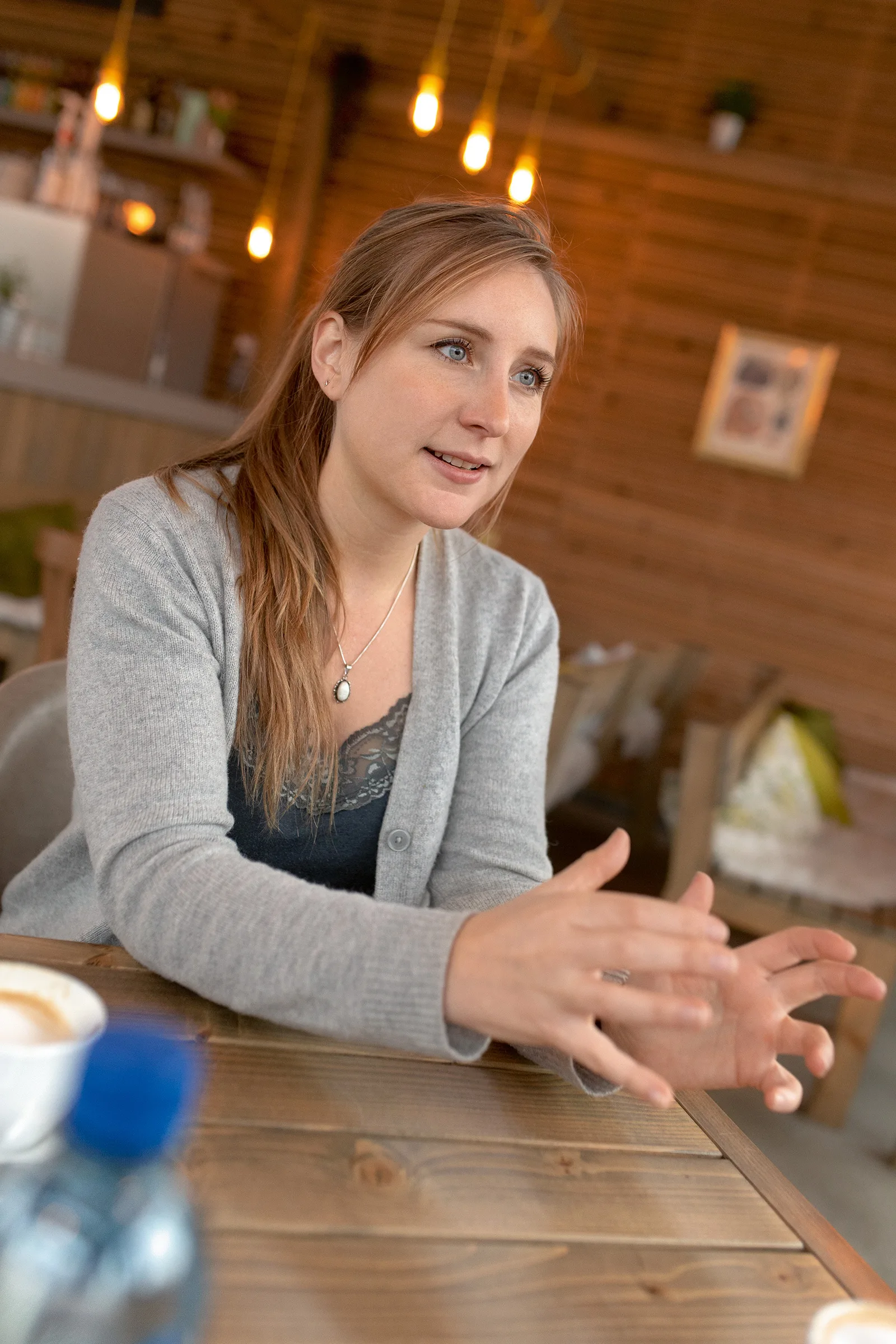
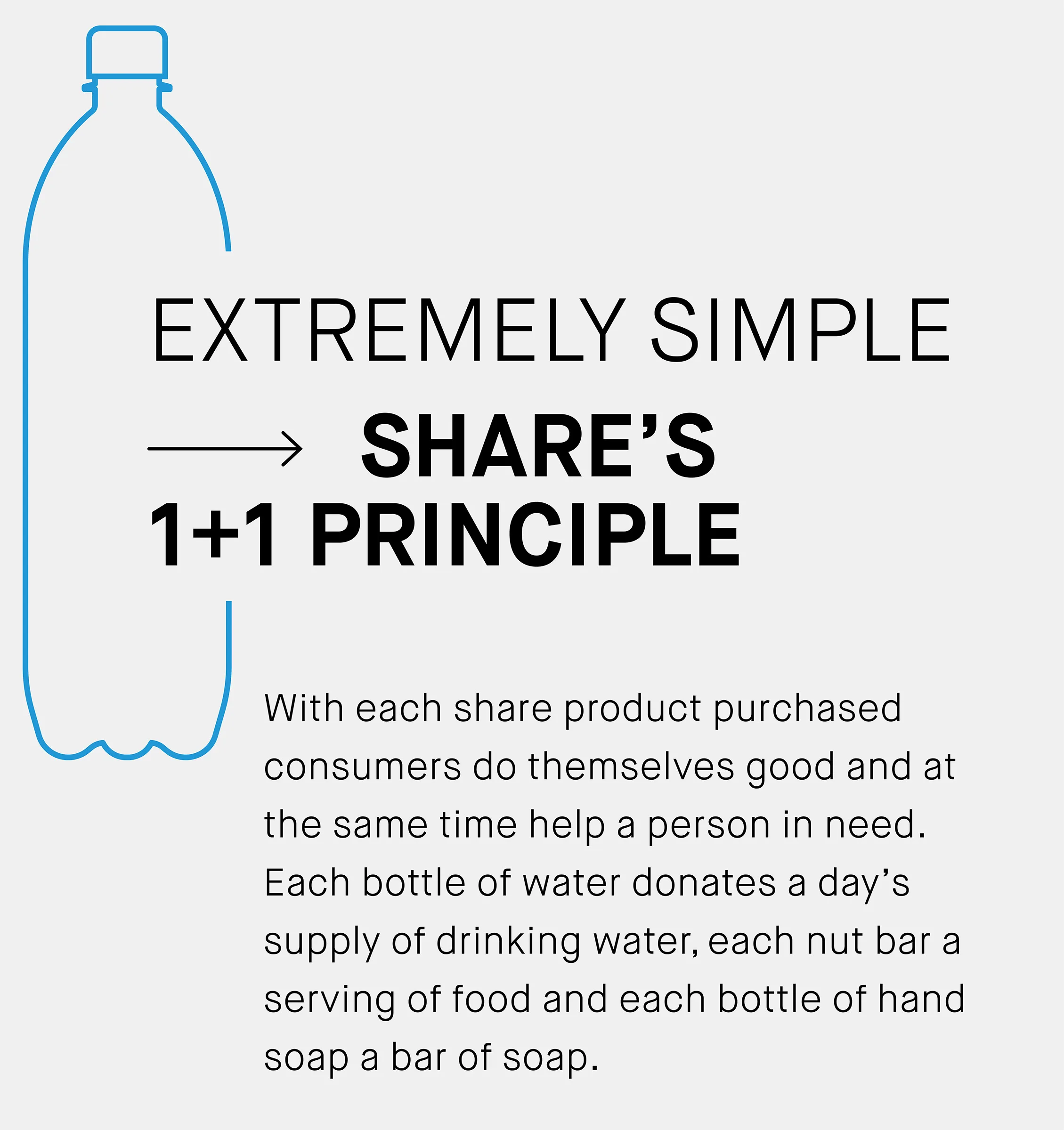
Have you any ambitions on an international scale?
Basically yes – the share brand also lends itself to this. First, however, we want to expand our portfolio before, as our second move, we scale up the project to cover Europe. In view of our success on the extremely difficult German market, where far less is spent on food than in any other European country, we’re optimistic about our international prospects.
»I’d like to spread the message of how little it costs to help others much further.«
Co-founder of the Berlin startup share
Have there been any disappointments so far?
Surprisingly few. We’ve been accused of only donating 10% of our turnover and of pocketing the rest. Who can understand the cost structure behind a normal product, let alone ours? With water, for example, up to 20% tax is first deducted, then there are the production and logistics costs. The amount we donate does in fact vary between 5 and 10% depending on the product. No other consumer goods company in the world donates that much; we therefore have absolutely no reason to hide our light under a bushel. With two to four eurocents we can pay for 20 liters of water; ten to 20 cents pay for a meal or a bar of soap. This is what’s important and I’d like to spread the message of how little it costs to help others much further. Of course I’d like everyone to understand our 1+1 principle – but essentially it’s enough if people know that this is a brand that does good.
How do you manage to stay true to your principles despite your great success and all the media attention?
None of us have any delusions of grandeur – not in the slightest. The far bigger challenge we face thanks to our rapid growth is how to build up our organizational structure. Developing internal processes, creating a business culture – this isn’t that simple and none of us has ever done this before. For a long time there were just four of us. A lot worked on an on-demand basis; with 40 colleagues this isn’t possible anymore. This is what we’re putting our energy into – and to enlarging our portfolio. If we then still have time to talk about share, then we’re happy to do so.
This interview was conducted by "KHS Competence" editor Stuart J. Nessbach.
